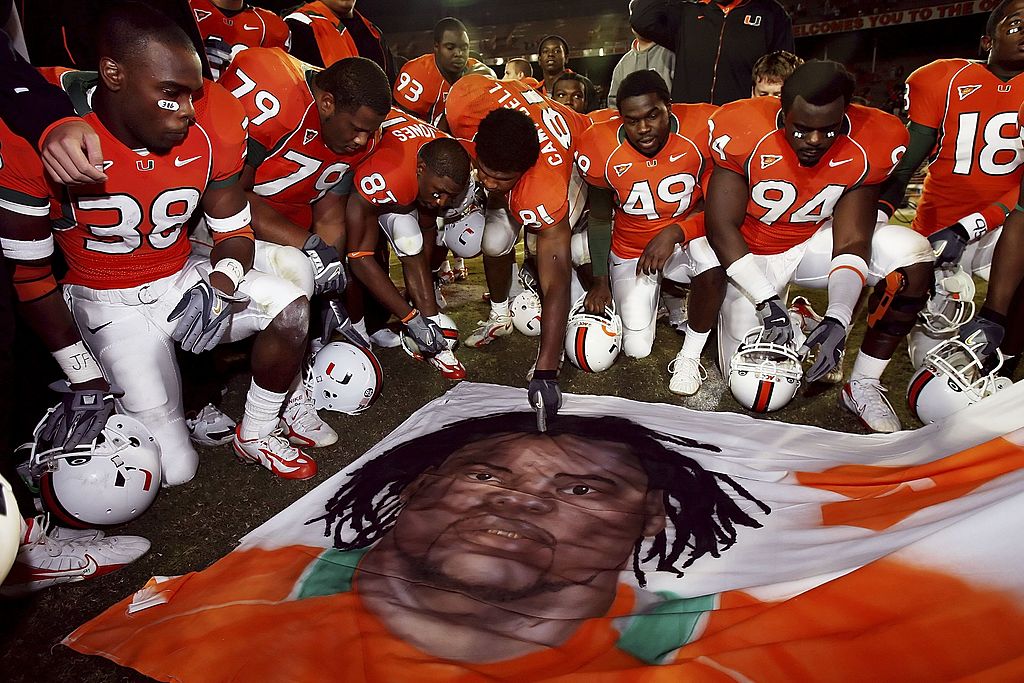
ESPN might be the sole reason the Pata family is receiving justice after their loved one had his life taken away from him way too soon.
On Thursday, it was reported that the police arrested a former Miami Hurricanes football player in connection to the November 2006 shooting death of teammate Bryan Pata, nearly 15 years after the crime and nine months after an ESPN investigation pointed out issues in the investigation.
Rashaun Jones, who was a teammate with Pata from 2004 to 2006, was arrested Thursday as part of a joint operation between the agency and U.S. Marshals.
It was back in 2019 when ESPN spoke with Jones briefly on the phone when he said he knew police and even some former teammates suspected him of killing Pata.
“What happened 12 years ago, happened 12 years ago,” he said at the time. “It’s got nothing to do with me. … I didn’t do it.”
His wife, Ishenda Jones, wrote in a text to ESPN that, “[Rashaun’s] comment was he was innocent. He did NOT kill Bryan. Miami-Dade found no evidence against my husband.”
Here’s what ESPN did to get the ball rolling on this case, which included them filing a lawsuit.
Click on ‘Follow Us’ and get notified of the most viral NCAA stories via Google! Follow Us
“Jones has long been considered a suspect in the 15-year-old homicide, a fact revealed last November in the ESPN report that traced the police investigation and outlined various theories — as well as doubts from Pata’s family that police had the commitment and skill to solve the case.
Police said publicly for years that they had no suspects, but during court proceedings last summer in a battle with ESPN over public records, an officer supervising the investigation said police “have a strong belief who killed Bryan Pata” and had come close to arresting this person at least a decade earlier.
Jones and Pata had a history of arguments and fights, and Jones had previously dated Pata’s girlfriend, Jada Brody, according to interviews and documents ESPN obtained. Brody cooperated with police around the time of the shooting, but she expressed irritation when police returned to ask questions months later, according to police records. The records do not show her saying anything about Jones’ possible involvement. Prior to publishing its 2020 story, ESPN reached out to Brody for more than two years by phone, text message and social media and through friends and relatives. She never agreed to an interview.
In March 2020, ESPN sued the Miami-Dade police for withholding and redacting records in the case, which the network argued should be public because the case was no longer active. But police disagreed it was dormant and promised a renewed effort.
Lt. Joseph Zanconato, who was later transferred out of the homicide unit, told the judge that police were just “a puzzle piece” away from closing the case. Asked whether the department would make an arrest “in the foreseeable future,” Zanconato answered: “Yes.”
Police reportedly had more than 4,000 pages in the case file with references to nightclub fights, stolen rims, jealous girlfriends, federal agents and even an alleged jailhouse confession.
ESPN interviewed a former teammate that recalled a fight between Pata and Jones where the latter issued a warning as the two were separated: “Boy, you might as well go ahead and clip up.”
Police said Pata and Jones had ongoing issues, with Pata allegedly beating Jones up during a physical altercation. Two months before the murder, Pata told his brother Edwin that Jones allegedly threatened to shoot him in the head. However, Pata did not report it.
On the night of the murder, Jones was absent from a mandatory team meeting called by coaches, even though he had been suspended that day after testing positive for marijuana. An arrest warrant noted that Jones said he was at his residence and never left on the night of the shooting, although location data from his phone placed him near Pata’s apartment. The warrant also noted about a gun Jones had that was the same caliber consistent with a bullet recovered from Pata’s head.
Police even noted in their report that Jones had given a false alibi after he told them he headed to the Hecht Athletic Center for the team meeting after hearing of Pata’s death.
“ESPN reviewed police notes that indicate Jones called a fellow Miami athlete to borrow money that night to go out of town. Police subsequently interviewed the athlete, who spoke to ESPN on the condition that he not be named and confirmed that Jones did ask for money; he declined to comment further. Coral Gables Police Chief Ed Hudak, a law enforcement liaison for the Hurricanes at the time, said that as he spoke with players at the football facilities on the night of Nov. 7, Jones’ name kept coming up.
“There was a very strong sentiment [Jones] had something to do with it,” Hudak said. “When that was brought up to me by the players, I made sure that the detectives had that. What came of those leads, I don’t know.”
Police say this was a calculated murder.
His family believed the motive for his murder was clear.
“He wanted to make it to the NFL and make my mother proud and he wanted to help his family,” brother Edrick Pata told NBC 6 in 2017. “I believe it was more so the jealousy, a lot of jealousy. The way Bryan carried himself, he was very bold, he was confident in what he did, he was confident he was going to graduate college, he was confident he was going to get drafted to the NFL.”



